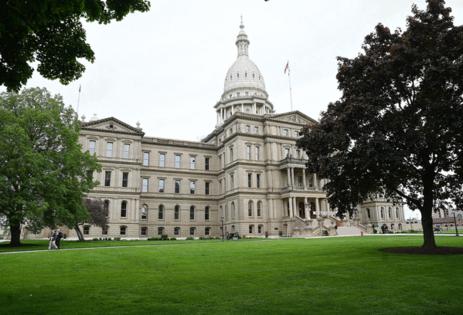Michigan lawmakers say they have agreement to pass budget before shutdown
Published in News & Features
LANSING, Mich. — The Republican-led Michigan House voted Thursday on a tax increase and a "decoupling" from federal tax law in an effort to raise more money for roads and reach an overall budget agreement with the Democratic-led Senate and Democratic Gov. Gretchen Whitmer before the Sept. 30 deadline.
The bills, which passed 78-21 and 95-4 with wide bipartisan support, would impose a 24% wholesale tax on marijuana and split Michigan from federal tax law changes that benefit businesses.
The votes were followed by a joint statement Thursday by Whitmer, Republican House Speaker Matt Hall and Senate Majority Leader Winnie Brinks that said the Legislature had reached an agreement to pass the budget on time and before a government shutdown that was set to begin Oct. 1.
"In Michigan, we’ve proven again and again that we can work together to get things done by staying focused on the kitchen-table issues that make a real difference in people’s lives," Whitmer said in the statement. "Amid so much national economic uncertainty, I am proud that we are taking action to lower costs, cut taxes for seniors and working families, create jobs, fund schools, fix roads, keep people safe and healthy, and so much more.”
The federal law changes, implemented through the One Big Beautiful Bill Act, would have cost Michigan about $677 million annually in tax revenue. To avoid that immediate hit to the state budget, the federal changes will be slowly phased into Michigan's tax structure over a period of years. State Rep. Mark Tisdel, R-Rochester Hills, described that phase-in as a deceleration of the federal plan.
"It's just decelerating what the federal government gave an acceleration to," Tisdel said. "The credits will still be there, the advantages will still be there. It's just spread out over more time, so we're not experiencing that kind of upfront crunch when we're trying to come up with billions additional for roads."
The "decoupling" bill also implements at the state level the federal tax exemption for tips, overtime and some Social Security income, according to a state House Fiscal Analysis.
The marijuana wholesale tax is expected to generate about $420 million based on current estimates of wholesale sales, according to a House Fiscal Agency analysis. That figure could change if marijuana's value continues to decrease, as it has amid an oversupply in Michigan in recent years.
The tax increases would be tie-barred to parts of a road funding plan passed by the House earlier this year.
That proposal, approved in March, would eliminate the 6% sales tax at the pump and replace it with a 20-cent-per-gallon increase in the fuel tax — a swap that would largely come out even for each gallon pumped — so all taxes paid at the pump would go toward road and bridge funding.
The House also voted 95-4 on legislation Thursday that would allow the state's so-called "provider tax," a tax levied on some health care providers and insurers to leverage more federal Medicare funding, to continue as long as the federal government continues to grant it a waiver. Under the One Big Beautiful Bill, states that continue to use the provider tax would be penalized, prompting Michigan to seek changes to its laws.
The bill requires the Michigan Department of Health and Human Services to develop a new tax structure in compliance with the One Big Beautiful Bill Act if the state is unable to get a waiver from the Centers for Medicare and Medicaid Services.
Without a waiver, the federal law would result in about $2.4 billion in fines directed toward the state, Tisdel said.
Michigan business advocacy groups criticized the "decoupling" proposal in a statement earlier this month.
"We ask policymakers to recognize decoupling from federal tax cuts will result in tax increases for Michigan businesses, including small businesses and employers," the business groups' statement said. "Michigan must remain competitive with other states, especially when federal tax policy is established to make all states more competitive against foreign competition."
And the marijuana wholesale tax on an industry struggling with oversupply and diving prices has been roundly criticized by industry associations.
Steve Linder, a former general consultant to the Michigan Senate GOP caucus and former executive director of the Michigan Cannabis Manufacturers Association, said Thursday the only people cheering on a massive tax increase on the marijuana industry are "criminals, court-appointed receivers and politicians who won’t fix the damn road funding formula.
"The Michigan cannabis industry is facing collapse," Linder said. "Fix the damn road funding formula.”
When Whitmer initially proposed the wholesale tax on marijuana earlier this year, her plan would have raised money through a wholesale tax similar to the 32% wholesale tax on tobacco. Instead, the House bill settles on a rate of 24%.
Last year, Michigan's recreational marijuana retail sales came in at about $3.2 billion, according to monthly reports from the Cannabis Regulatory Agency.
The two tax increases were among about a dozen presented to House and Senate Republicans during a private meeting Wednesday to decide on the least offensive options. The other possible new revenue sources for roads included heavy truck, electric vehicle and gas-electric hybrid registration increases; digital advertising and delivery taxes; vape taxes; the taxation of hemp drinks; a corporate or individual income tax hike; and increased taxes on iGaming.
_____
©2025 The Detroit News. Visit detroitnews.com. Distributed by Tribune Content Agency, LLC.







Comments